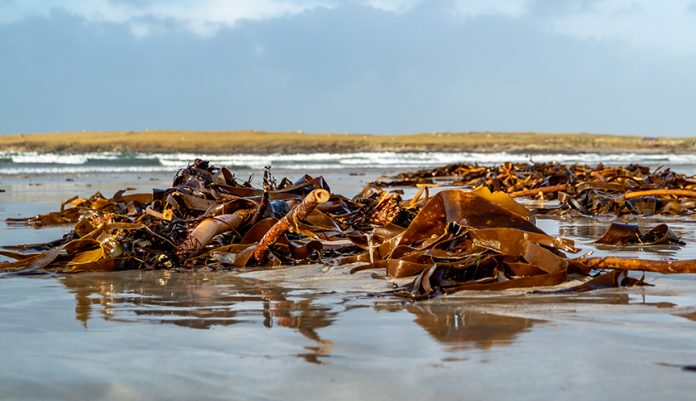An innovative Welsh biotech start-up is developing 100% biodegradable, soil-enriching products to tackle the mounting problem of agricultural plastic waste.
PlantSea is testing a seaweed-based bioplastic to replace agricultural plastic sheets, also known as mulch film, used to increase crop yields.
A staggering 45,000 tonnes of agricultural plastics are reportedly produced every year in the UK, according to a Defra 2010 study – and sheets spread over the soil to serve as a plastic mulch film1 make up over 40% of the total agri-plastic market.
The Environment Agency has highlighted agri-plastic waste as a concern, because much of the 71% of land dedicated to farming in the UK is close to watercourses.2
A study on microplastics in freshwater and soils from the Royal Society3, shows that some scientists believe there are higher concentrations of microplastics in rivers than in the sea, and there is evidence that the presence of microplastics in organisms can affect their habits by reduced feeding, decreased movement, and increased buoyancy, which affects feeding and swimming behaviour.
Seaweed solution
PlantSea, supported by AberInnovation business support programmes for industry, is producing seaweed-based biopolymers to create bio-plastic mulch films for growing food crops more sustainably, with plans to roll them out commercially to farmers.
Co-founder Rhiannon Rees says there is an urgent need for sustainable alternatives: “Farmers use plastic mulch film to protect plants from insects and weeds, to keep the ground warm, and ultimately, achieve higher yields. They are great for lettuce and other salad crops.
“Plastic mulch films go to landfill, and although there are some biodegradable films available that are made from starches, unless they are ploughed back into the soil and left for one year, they don’t degrade into compost.
“Our prototypes of seaweed film are biodegrading well in soil with no need to plough them in,” says Rhiannon.
“Seaweed is a very versatile, sustainable plant, which is readily available in the ocean. It grows 20 times faster than trees and it absorbs huge amounts of carbon.
“Seaweed farming is in its infancy in the UK, but it’s huge in Southeast Asia and some parts of Northern Europe, and it’s a great industry for coastal communities.
“Our aim is to make seaweed-based bioplastic mulch film readily available to farmers and for it to be competitively priced,” explains Rhiannon.
Rhiannon says seaweed has a lot of untapped potential for other uses. “We’ve been developing sachets and pods we can put liquid in, which can replace PVOH water-soluble polymers, used to wrap dishwasher or laundry tablets.
“There’s also a need for biodegradable bale wrap, which we’re also looking at, as well as storage for dried goods, such as food and powders,” she adds.
Launchpad and Productivity 2 Prosperity funding
PlantSea launched their business at AberInnovation at Aberystwyth University, which has been pivotal to the development of the business through providing access to funding.
“We have utilised the Mid Wales Challenge Led Launchpad programme which has helped us to do more research with Belfast University so we can learn about the seaweed polymers and what they can and can’t do,” says Rhiannon.
“We also received funding for a research assistant, which means we are now in a position to scale up from lab to industry.
“We’re looking for investment and collaborators to bring this project to commercial scale,” adds Rhiannon.
Dr Rhian Hayward MBE is chief executive officer for AberInnovation and says the aim is to help businesses like PlantSea to start, scale and succeed. “Bridging the gap from academia and research to industry is what we do, and our members can access not only funding, bwut networking, events, advice and support.”



